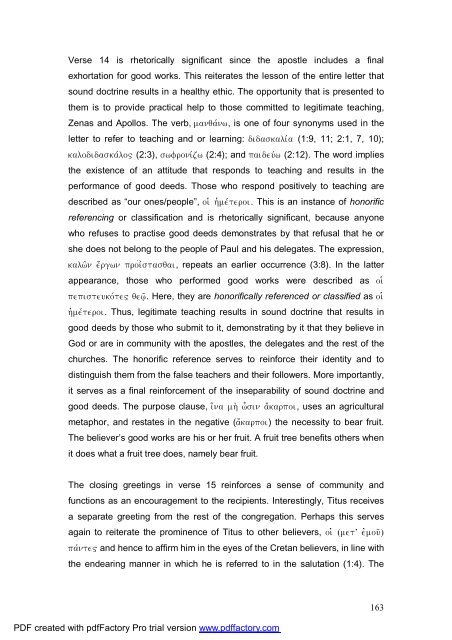A Text centred rhetorical analysis of Paul's Letter to Titus
A Text centred rhetorical analysis of Paul's Letter to Titus
A Text centred rhetorical analysis of Paul's Letter to Titus
Create successful ePaper yourself
Turn your PDF publications into a flip-book with our unique Google optimized e-Paper software.
Verse 14 is <strong>rhe<strong>to</strong>rical</strong>ly significant since the apostle includes a final<br />
exhortation for good works. This reiterates the lesson <strong>of</strong> the entire letter that<br />
sound doctrine results in a healthy ethic. The opportunity that is presented <strong>to</strong><br />
them is <strong>to</strong> provide practical help <strong>to</strong> those committed <strong>to</strong> legitimate teaching,<br />
Zenas and Apollos. The verb, manqavnw, is one <strong>of</strong> four synonyms used in the<br />
letter <strong>to</strong> refer <strong>to</strong> teaching and or learning: didaskaliva (1:9, 11; 2:1, 7, 10);<br />
kalodidaskavlo" (2:3), swfronivzw (2:4); and paideuvw (2:12). The word implies<br />
the existence <strong>of</strong> an attitude that responds <strong>to</strong> teaching and results in the<br />
performance <strong>of</strong> good deeds. Those who respond positively <strong>to</strong> teaching are<br />
described as “our ones/people”, oiJ hJmevteroi. This is an instance <strong>of</strong> honorific<br />
referencing or classification and is <strong>rhe<strong>to</strong>rical</strong>ly significant, because anyone<br />
who refuses <strong>to</strong> practise good deeds demonstrates by that refusal that he or<br />
she does not belong <strong>to</strong> the people <strong>of</strong> Paul and his delegates. The expression,<br />
kalw`n e[rgwn proivŸstasqai, repeats an earlier occurrence (3:8). In the latter<br />
appearance, those who performed good works were described as oiJ<br />
pepisteukovte" qew`/. Here, they are honorifically referenced or classified as oiJ<br />
hJmevteroi. Thus, legitimate teaching results in sound doctrine that results in<br />
good deeds by those who submit <strong>to</strong> it, demonstrating by it that they believe in<br />
God or are in community with the apostles, the delegates and the rest <strong>of</strong> the<br />
churches. The honorific reference serves <strong>to</strong> reinforce their identity and <strong>to</strong><br />
distinguish them from the false teachers and their followers. More importantly,<br />
it serves as a final reinforcement <strong>of</strong> the inseparability <strong>of</strong> sound doctrine and<br />
good deeds. The purpose clause, i{na mh; w\sin a[karpoi, uses an agricultural<br />
metaphor, and restates in the negative (a[karpoi) the necessity <strong>to</strong> bear fruit.<br />
The believer’s good works are his or her fruit. A fruit tree benefits others when<br />
it does what a fruit tree does, namely bear fruit.<br />
The closing greetings in verse 15 reinforces a sense <strong>of</strong> community and<br />
functions as an encouragement <strong>to</strong> the recipients. Interestingly, <strong>Titus</strong> receives<br />
a separate greeting from the rest <strong>of</strong> the congregation. Perhaps this serves<br />
again <strong>to</strong> reiterate the prominence <strong>of</strong> <strong>Titus</strong> <strong>to</strong> other believers, oiJ (metÆ ejmou`)<br />
pavnte" and hence <strong>to</strong> affirm him in the eyes <strong>of</strong> the Cretan believers, in line with<br />
the endearing manner in which he is referred <strong>to</strong> in the salutation (1:4). The<br />
PDF created with pdfFac<strong>to</strong>ry Pro trial version www.pdffac<strong>to</strong>ry.com<br />
163

















